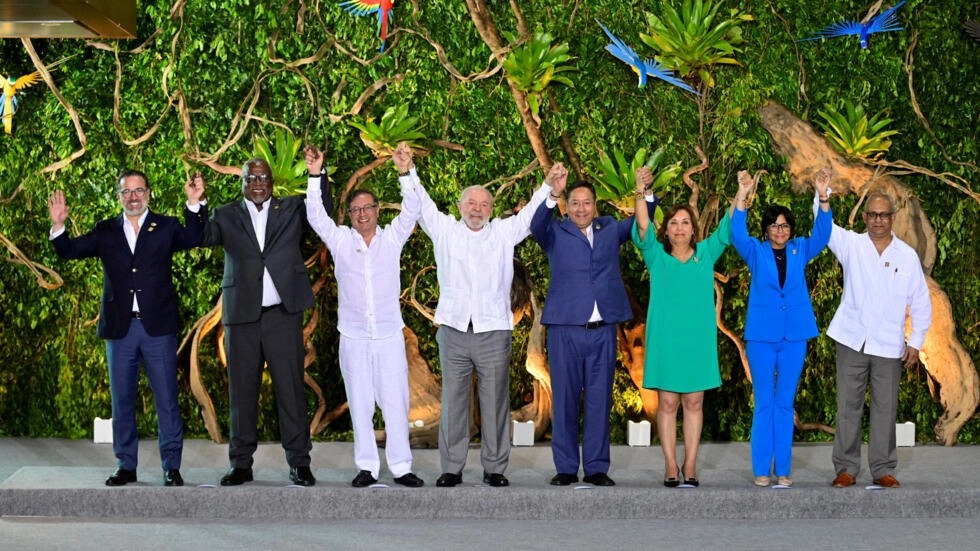Photo: Reuters
Authors: Denisse Linares and Diandra Torres
The Amazonian Presidents’ Summit promised to raise commitments and divide responsibilities, among the 8 signatory countries of the Amazon Cooperation Treaty (ACT), on the future of the Amazon biome. However, the results have not been entirely encouraging, because no clear commitments and strategies have been generated to counteract the ecological crisis hand in hand with the Amazonian peoples.
Prior to the meeting of the presidents, within the framework of the Amazon Dialogues, civil society organizations proposed actions necessary to protect the rights of indigenous peoples, quilombolas and peasants, as well as to reverse the situation of environmental degradation and the acceleration of climate change. In this context, one of the fundamental issues is the recognition of territories and lands as a fundamental condition for the advancement of other processes such as the abandonment of fossil fuels together with a just, feminist, democratic and communitarian transition; as well as rethinking connectivity, and strengthening the indigenous economy to improve the quality of life of Amazonian peoples in both rural and urban areas.
There are no intentions for the promotion of just, feminist and community-based energy transition: One of the key issues for civil society has been the reduction and abandonment of new oil prospecting and exploration, due to the irreversible socio-environmental impacts. In this regard, the Declaration of the Peoples’ Summit called for the fulfillment of the commitment to provide 100 billion dollars annually to developing countries for the socio-ecological energy transition; however, the Declaration of the IV Meeting of Presidents of the States Parties to the Amazon Cooperation Treaty does not mention actions to reduce or replace fossil fuels, which is the great disappointment of this Summit, due to the expectations it had generated.
The energy transition is not limited to electrification: Currently, there are gaps in energy access, mainly in rural areas. Actions to reduce this gap must have a comprehensive approach so that energy improves the quality of life and meets local needs, taking into account community dynamics. The Declaration focuses on deepening existing initiatives to integrate and strengthen electricity systems for isolated locations, as well as identifying new electric power projects and new clean energy models. This perspective must include a human rights approach, differentiated impacts, and the impacts that new energies are already generating. The change is not only about the energy source but also about paradigms.
It is still necessary to look at connectivity in a way that is consistent with the current context. The Declaration mentions the incorporation of sustainability standards in the planning and execution of infrastructure projects, as well as their environmental, social and economic impacts, in harmony with the conservation of ecosystems, consulting and duly respecting the human rights of indigenous peoples and local and traditional communities, from the planning stage, in accordance with the respective national legislation. However, it still does not include climate risks in the intervention areas and thus target the most vulnerable areas that require early intervention or climate adaptation measures to reduce impacts on populations and deforestation associated with infrastructure projects (IDB, 2019; CAF, 2020; DAR, 2023).
Lack of recognition of the diversity of Amazonian peoples and the context of environmental and indigenous defenders. While it is true that the Declaration recognizes indigenous rights, as well as collective rights such as prior consultation as part of the general framework, there is no mention of the quilombolas, peasants, riparians, who are also being affected in their lives and integrity by environmental impacts and the defense of their territories. Even less does it mention the need for the ratification of the Escazú Agreement as an international agreement for the defense of the environment and rights.
The indigenous economy as a paradigm shift to large-scale production and consumption. The Interethnic Association of the Peruvian Rainforest (AIDESEP) presented different economic initiatives aimed at respecting the cycles of nature and improving the quality of life of the communities. With this in mind, the Declaration established the promotion of a fair and ethical economic development model based on biodiversity, science, ancestral and traditional knowledge, as well as a production chain program. It is important to propose the transformation of the modes of production in a way that does not deplete the land, its resources and generate impacts on human rights.
All these requests were developed by civil society organizations from the 8 countries of the Amazon Basin, thus bringing together a great potential in knowledge, experiences and solutions. Therefore, an event of this magnitude should have developed proposals for regional strategies taking into account broader processes with civil society and Amazonian populations in order to generate national actions that allow for real and rapid solutions. In this sense, it is necessary to create more conditions for consensus with all the community diversities and real problems of the Amazon.


